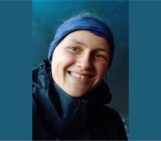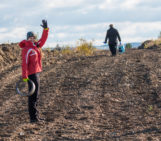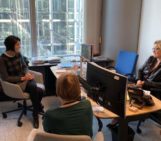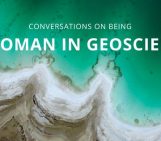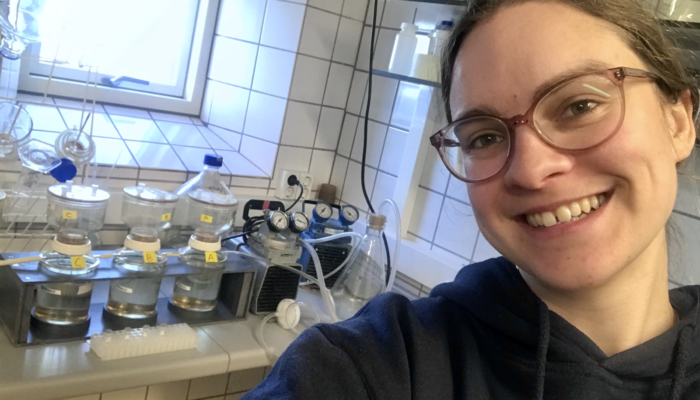
Hello Meriel, thank you for speaking with us today! Could you introduce yourself?
My name is Meriel Bittner and I am the Early Career Scientist Representative for the Ocean Sciences (OS) Division of EGU. Currently, I am a PhD fellow at the University of Copenhagen. Originally from Germany, I did my Bachelor and Master at the University of Vienna in Austria, hence I have attended multiple general assemblies of EGU. In 2019 I moved to Denmark, and recently I started a change of environment by joining North Carolina State University in the US as part of my PhD.
As a marine microbiologist you investigate how microorganisms affect the oceans nutrient cycles and biochemistry. Could you tell use a bit more about your research?
My background is in ecology and ecosystems with a microbial focus. I am fascinated by microorganisms, as they are highly abundant throughout the environment and very diverse. Marine microorganisms significantly influence global biogeochemical cycles, water quality, and ecosystem productivity. Understanding how other nutrients, besides prominent nitrogen and phosphorous compounds, behave in the ocean and regulate marine microorganisms is thus highly relevant.
My current research focuses on vitamin B1, an essential organic micronutrient. Meaning, vitamin B1 is a small molecule that is needed by virtually all living cells in minute amounts. In the ocean it is mainly produced by marine bacteria and phytoplankton. However, the puzzling thing is that not all of those organisms are capable of producing B1 themselves and the B1 concertation in the environment is typically very low. This opens up a range of questions such as how this can be beneficial to cells, how B1 is related to other marine nutrients, and how the B1 concentration is changing throughout the year and if other molecules related to B1 can also be used. In my PhD I am combining oceanographic, microbial, and chemical methods at different coastal sites to understand the dynamics of B1 in relation to the microbial community.
The theme for this year’s World Oceans Day is “The Ocean: Life and Livelihoods”; what key message regarding the human impact on the ocean would you like our readers to leave with?
Ocean Scientists often bring up the example that more of the moon’s surface is explored than the deep ocean. Although more and more of the oceans is being researched, some knowledge is also already lost and we will never know how the environment was really before the strong changes we’re observing now. Even the most remote places of the global ocean, such as the deep sea and the polar regions, are already impacted by climate change, anthropogenic CO2, and other compounds.
In the last few years marine plastic pollution has received more attention and, while being a huge problem for sure, it is also only one of many challenges that our global ocean faces: ocean acidification, ocean deoxygenation, and chemical pollution are also human-induced, either directly or indirectly via climate change. These impacts are just less visible and not so often talked about. By mitigating and reducing climate change we are directly helping the marine environment and all the livelihoods connected to it as well. Each of us has the opportunity to learn about the range of human impacts on the ocean and also to protect the ocean. One really great resource to find out more is the World Ocean Series.
You’re also the Early Career Scientist Representative (ECS) for the Ocean Sciences (OS) Division – could you tells us what that involves?
I have been the ECS Representative for OS for more than one year now and it has kept me quite busy with multiple tasks besides my PhD. My main role is being the contact person for ECS in Ocean Sciences and to represent their views at EGU. During the general assembly, I organize networking events for the OS division and I am also in contact with other ECS networks in the field of Ocean Science. The committee of ECS representatives from all 22 divisions meet about every six weeks to discuss initiatives for ECS and their role within EGU. This way we as ECS Reps try to strategize and disseminate information as initiatives change or are decided at EGU, keeping our ECS communities updated while making sure their voices are heard.
Recently, I took over as lead of the ECS jobs and careers working group. We organize events related to career development (e.g. webinars on careers outside of academia) and put together tips and tricks such as how to improve your CV. I am also part of the ECS working group for wellbeing, which focuses on the topics of mental health and work-life balance. With both working groups we organized a range of events and short courses during the general assembly and events throughout the rest of the year.
Last year we launched the Ocean Sciences Division blog for which I am responsible. For the blog I co-ordinate with the other blog editors to produce posts, and find guest authors who’s blog posts I then edit and implement on the blog. Additionally, I take care of the social media channels belonging to the OS division: you can find us on Twitter and Facebook.
There are several aspects to being an ECS representative; I think it is really important what the ECS committee is doing and I love creating events with added value for ECS together with other inspiring and motivated ECS representatives!
How can our readers become involved with the Ocean Sciences Division?
We are always looking for more ECS to become involved and active in the OS division. You can contact me via the ecs-os@egu.eu email or via social media such as Twitter or Facebook.
If you think you have a cool research paper published and would like to write a guest blog post and to try some science communication, please contact me!
Finally, what are your next steps?
Currently, mental-health is a topic we talk about a lot in the ECS committee, including how to support our ECS community more during the on-going global pandemic. Based on the feedback we got during the numerous short courses and networking events organized by ECS at the general assembly 2021, we are now planning webinars and blog posts for later this year on mental-health, mentoring, and non-academic jobs.
Thank you for spending your time with us today and answering all our questions!
Interview by Simon Clark, EGU Programmes Committee Co-ordinator.

